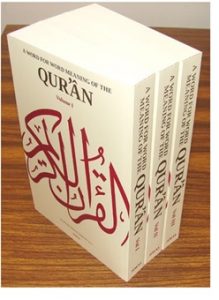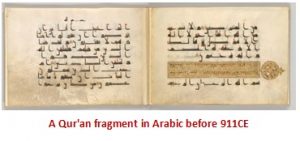Qur’anic Words: Etymology
 In the following lines we present a short article that we felt could be of interest to some of our readers. While we wish to encourage the author, DR. AAISHA FATIMA, to work more on these lines, we may point out that many of the 100 words quoted as examples are not quite convincing. For example, the following words:a. Zero is derived from (زروع) 62:9. Zero meaning is nothing at all. Keep trading at nothing or stop trading.b. In Spanish, market place is Azogue; it is from Arabic السوق۔c. Corner رکن. Deeper research will be necessary, especially to find out, and demonstrate, that the words in question came into usage ‘after’ the Qur’anic Revelation. This is because these languages are older than the Qur’an. Dr Aaisha Fatima’s original article (after some editing) is as shown herein under.
In the following lines we present a short article that we felt could be of interest to some of our readers. While we wish to encourage the author, DR. AAISHA FATIMA, to work more on these lines, we may point out that many of the 100 words quoted as examples are not quite convincing. For example, the following words:a. Zero is derived from (زروع) 62:9. Zero meaning is nothing at all. Keep trading at nothing or stop trading.b. In Spanish, market place is Azogue; it is from Arabic السوق۔c. Corner رکن. Deeper research will be necessary, especially to find out, and demonstrate, that the words in question came into usage ‘after’ the Qur’anic Revelation. This is because these languages are older than the Qur’an. Dr Aaisha Fatima’s original article (after some editing) is as shown herein under.
May Allah bless my mother, who taught me Quran both Qaeda and Nazira. She has to teach me Qur’an in English medium, as I was not well-versed in Urdu and was learning in a convent school. I dedicate this article to her.
During teaching of Qur’an, she used to explain me some simple teachings of Qur’an and had to take efforts to find out meaning of Qur’anic words in English. This was the turning point for me.
Later on, while studying Qur’an, I was having inclination to find out Qur’anic words having foreign languages in origin. And the result of elaborate study for a period of eight to ten years is this piece of writing.
Qur’an is actual word of Allah(swt), revealed for the benefit of mankind. Its language is Arabic, spoken in and around Hijaz. Religions in this area were mostly Pagan Arabs, Jews and Christians and some small denominations. So Qur’an was particularly addressing these people and humankind, in general.
Arabs used to go to countries far and near for trade and commerce. Thus Qur’anic words got embedded in foreign languages.
Under the direct guidance of Prophet Muhammad(saws) and divine message of Qur’an, a quantum change was observed in Arabs.
Over a period of a few years, Islam spread from its place of origin in Arabian Peninsula, all the way to modern Spain in the west and northern India in the east.
Qur’anic ideas and teachings travelled along various trade and pilgrimage routes.
The Caliphs shifted the capital from Makkah to European cities and replaced administrative language to Arabic. They developed more sophisticated bureaucracy.
They increased focus on arts, science, and literature, and built imperial structures. Under the divine guidance of Qur’an, they took on judicial duties and developed a system of law.
Under the divine guidance of Qur’an they could make Arabic and Qur’anic vocabulary the everyday language of the people, in the lands to which they spread. This is the reason for Qur’anic vocabulary (which) was embedded in so many foreign languages.
I prepared a list of more than 3000 Qur’anic words, which look English, smell Latin, taste French, Greek, Spanish, Persian and other foreign languages. Linguistically speaking, Qur’an has made a huge impact on the human race.
 This is the beauty of Qur’an, which addresses the mankind in their language, so that they can understand Qur’an.
This is the beauty of Qur’an, which addresses the mankind in their language, so that they can understand Qur’an.
Only selected Qur’anic words are discussed to convey the linguistic facts that speak for themselves. This article is clear explanation of Qur’anic words that have become part and parcel of foreign languages.
The above words will accredit the Qur’anic words embedded in foreign languages, and goodwill contribution and usefulness of studying linguistics of Quran. A talk maybe required for explaining long list of other words.
It is not merely catalogue of words but a lively discussion based on linguistic evidence, and characterised by profound respect and regard to all languages.
(The author is an Intern at Indian Institute of Medical Sciences and Research, Jalna.)

